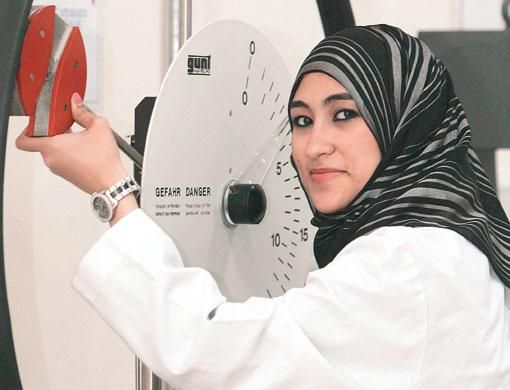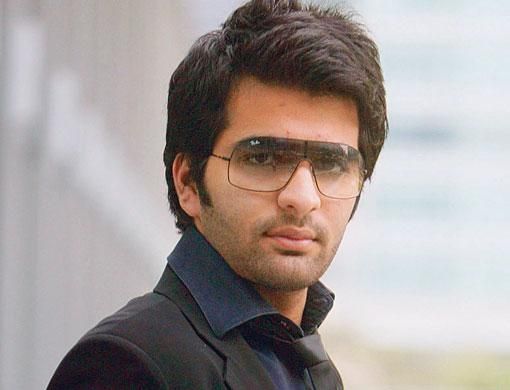Stereotypes exist all over the world in every culture. The mention of certain professions brings a specific gender to mind. Naming particular jobs - doctor, stockbroker, nurse, engineer, beautician, journalist, bricklayer, fashion designer, investment banker, truck driver, hairdresser, lawyer - are stereotypically associated with either the male or female gender.
There are certain set rules as to what men and women are capable of in the workplace. While manual labour is mostly male orientated, certain genders tend to gravitate towards specific professions for various reasons. However, these boundaries are becoming less defined in an increasingly globalised world and an emerging shift in gender roles.
Aliah Al Laham, 19, a finance student at the American University of Sharjah (AUS), regards gender stereotypes as a result of tradition and how children are raised in the Middle East. For females raised in a house where their mothers do not work, a desk job is a convenient option.
"Girls in this region prefer to have fun rather than take on responsibility, they see it as the job of a man," said Aliah. She says gender stereotypes can have a negative impact as they "stop people from pursuing their dreams".
In a world of rapid change, growth and expansion, stereotypes are no exception as they too change. "Gender stereotypes exist as a way of safeguarding a particular profession and restricting it to a smaller market. If all professions were equal, competition would increase among candidates," said Areeba Hanif, a digital filmmaking lecturer at the SAE Institute in Dubai.
"In some cultures it is not acceptable for a woman to be in a certain industry while in other cultures, some professions are seen to be suited more for males or females. So on the one hand, it is about what is acceptable in society and on another it is pre-conceived notions of which gender is better at what," said Hanif.
Aditi Jajal, 18, is studying audio engineering at the SAE Institute. She finds that being a female in a male-dominated environment pushes her to "work harder to prove a point" and strive to excel, on par with her male peers.
"We are very fortunate to live in a culturally-progressive society like Dubai. The gender segregation issue is diminishing and that is fortunate," said Abduallah Nasrawi, 24, an audio engineering student at the SAE Institute.
However the issue of equal pay remains. In most countries, a woman fulfilling the same job description as a man is still paid substantially less than her male counterpart. The introduction of bills such as the Equal Pay Act of 1963 in the US, for example, attempts to tackle this issue.
With the appointment of Kholoud Ahmad Joan Al Daheri, the first UAE national woman judge, change appears to be on the horizon in the UAE.
Englishman Dr Ashly Pinnington, professor of human resource management and dean of the faculty of business at the British University in Dubai, chose his career in academia due to his interest in human issues. He began his career in information technology and artificial intelligence and realised it was not for him. His family and society played a big role in the choice of his career path.
"I was the odd one out in my family as my father and all my uncles are businessmen. I have always been interested in reading, writing and solving puzzles. I'm always curious to find out new things and my chosen career path offers me that," he said.
Dr Pinnington teaches human resource management and 100 per cent of his students are female. "People are just realising there is a market for human resource jobs with high-paying salaries in the UAE. The notion that a human resources role differs from a secretarial role, is just starting to sink in," he said. A secretarial role is typically viewed as a woman's job.
Various cultures have varying attitudes towards gender in relation to the workforce. However, stereotypes do exist and this is a point that needs addressing through "leadership, mentoring and careful attention to cultural issues from all institutions" said Dr Pinnington, adding: "Governments need to bring in initiatives to support established and emerging gender role issues.
He explained organisational commitment as follows:
"Women are viewed as care-givers and child-bearers and therefore if a female is married her organisational commitment is low. Whereas if a man has children his organisational commitment is higher because his family commitments are greater," Dr Pinnington said.
Denis Ravizza, a French teacher and art director at ESMOD International Fashion University in Dubai, comes from a family of artisans. Born in Paris, Ravizza was surrounded by art and culture during his growing up years, inevitably leading him down the creative path. As an art director of a fashion school in Dubai, 90 per cent of his students are female but the number of male applicants is increasing.
"In this region, fashion is considered feminine. This is culture-based because parents think a business education is more suited as it results in a secure and stable job. The stereotype is that a man shouldn't 'waste' his time pursuing a creative career. Parents fail to realise how many men are employed in the fashion industry; a sector which at the end of the day, is a business," said Ravizza.
He said the reason for this stereotype may be because UAE's growth stemmed from business, trade and real estate which all produce tangible results. "Creativity is very vague. A true artist creates because he has to, because if he doesn't he will suffocate. Knowing how to create is knowledge which is a [bankable] practical skill," said Ravizza.
"It is clearly defined here what a man should and shouldn't do. A man should head a family and run a business. These stereotypes don't apply as much in my country. Where I come from, anyone can wash the dishes," said Ravizza.
He believes students must break the professional gender stereotypes by proving they can be a success regardless of their chosen field.
Habiba Al Abdooli, IT business student at Dubai Women's College (DWC), said she chose her major because she had a passion for it and felt she was able to excel in it. "I enjoyed my IT classes. I was studying and discovering at the same time." Her parents, she said, accepted her decision.
Her perceptions of men and women's capabilities are flexible upto a certain degree. "I believe men should be in certain fields that are tough and complicated. Examples are directing or managing organisations&. Women are more about details and men look at the larger frame of things. The excellent picture needs both."
Surprisingly Habiba discovered that male teachers are better than their female counterparts. "I prefer male teachers because they are more careful about my understanding of the material and emotions than women. I always thought women are more understanding but I discovered it was the opposite," she said.
Habiba said she believes in some stereotypes. As long as a woman is suitable for the "tough" position, let them go for it. "That's why I went after business," she said.
"God created us [women] to be emotional so we can't be good judges. We are always influenced by our emotions," Habiba said.
Aisha Gargash is a second-year information technology business student at DWC. She says her major helps her to be in both IT and business. "For me, majors are very flexible and women are capable of being managers but it's the men who don't like it. But on the other hand, women have more creativity.
"There are some majors that are difficult for women, such as being a pilot because she'd be alone and far away most of the time. Being in the police, which is a male-dominated field, is also unfamiliar in society. I personally think it is okay. Everything is okay within limits and relationships between genders should be defined," she said.
She added: "Men can do almost anything they choose, but their nature for example is not inclined towards positions that need caring such as taking care of babies or cooking. Women have a passion and an understanding of babies and of people."
Saniya Mulla, who studies media at Middlesex University Dubai, said her class of 50 has just six male students. "Guys want to go into the corporate world and have a fixed income because they're the bread-earners&. I think this is pathetic because men should be given an equal chance to explore as women," she said.
Ruwaida Shaikh, who studies psychology at the same university, said: "It's also restricted for women. If you walk into any organisation, the receptionist is usually a woman.
"Telesales and marketing people tend to be females, probably because they are more caring, emotional and sensitive than men& . Men are not in touch with their emotions."
Becky Kilsby, careers counsellor at Middlesex University, Dubai, interacts with students as they try to discover their interests and skills. "Students who discuss their motives for choosing their majors, often discuss pressure by parents," she said.
The gender spread across programmes offered by the university reveals a heavy domination of females in psychology and media studies courses, with the former having a female to male ratio of 9:1. Business and information technology, despite the sub-specialties, are mainly male-dominated.
"It is extremely complex why that is. It could be cultural and family expectations in terms of what is perceived to be a good choice for them but also a perception of what careers are suitable for them as well," Kilsby said.
Family influence is more pronounced here than it is in other parts of the world in terms of perceiving certain careers and courses as more appropriate to certain genders, Kilsby added.
Shireen Roughani, a liberal arts instructor at the American University in Dubai (AUD) said: "Gender stereotyped professions need to be changed for the better, so both males and females have an equal opportunity to fulfill their career goals. They can be changed first on a personal level, then in the family, next in society and then societies can influence one another resulting in a global change."
Students who are trying to add flexibility to their choices should think about themselves, their own interests, career aspirations and strengths, she said. "Those may be along gender lines and they may not& I tell students to think about themselves as individuals not as a man or a woman. It's always better to think about what your career goals are and if you're likely to succeed in those fields."
In the last couple of years, female students have been breaking into certain fields such as business, medicine and engineering.
In terms of changing stereotypes it's a long process and has to be part of people's upbringing, Kilsby said. "Everybody should have equal career opportunities and jobs shouldn't be advertised for females and males individually. Sometimes I receive gender specifications for part-time promotions jobs and I try to ensure I only send out half of those. My policy is equal opportunities," she said.
Rahun Rajendran, an accounting and finance student, said times are changing for students today. "We're in a new era where everything is changing. Engineering and medicine receives many students every year& . But you still find that psychology is mainly a feminine discipline. If I had been interested in psychology, I might have pursued it but for me, I've always been fascinated by money," he said.
By the look of things, the stereotypes seem to be changing, albeit slowly. Despite their hesitations, female students are breaking into male-dominated fields and male students are feeling less awkward about being in 'feminine' labelled positions.
Common stereotypesSome stereotypes we came across while we were interviewing students
n Women are more creative than men.
n Women are more emotional and understanding than men. n Men are suitable in tough and complicated positions.
n Women are good in marketing positions because they understand people.
n The military, police and religious institutions are better suited for men.
n Women should take on care-giving roles like taking care of babies and social work. n Men are not in touch with their emotions.
n Fashion is not a serious profession and is mainly for women. n Men are in business because they are the bread-earners.















